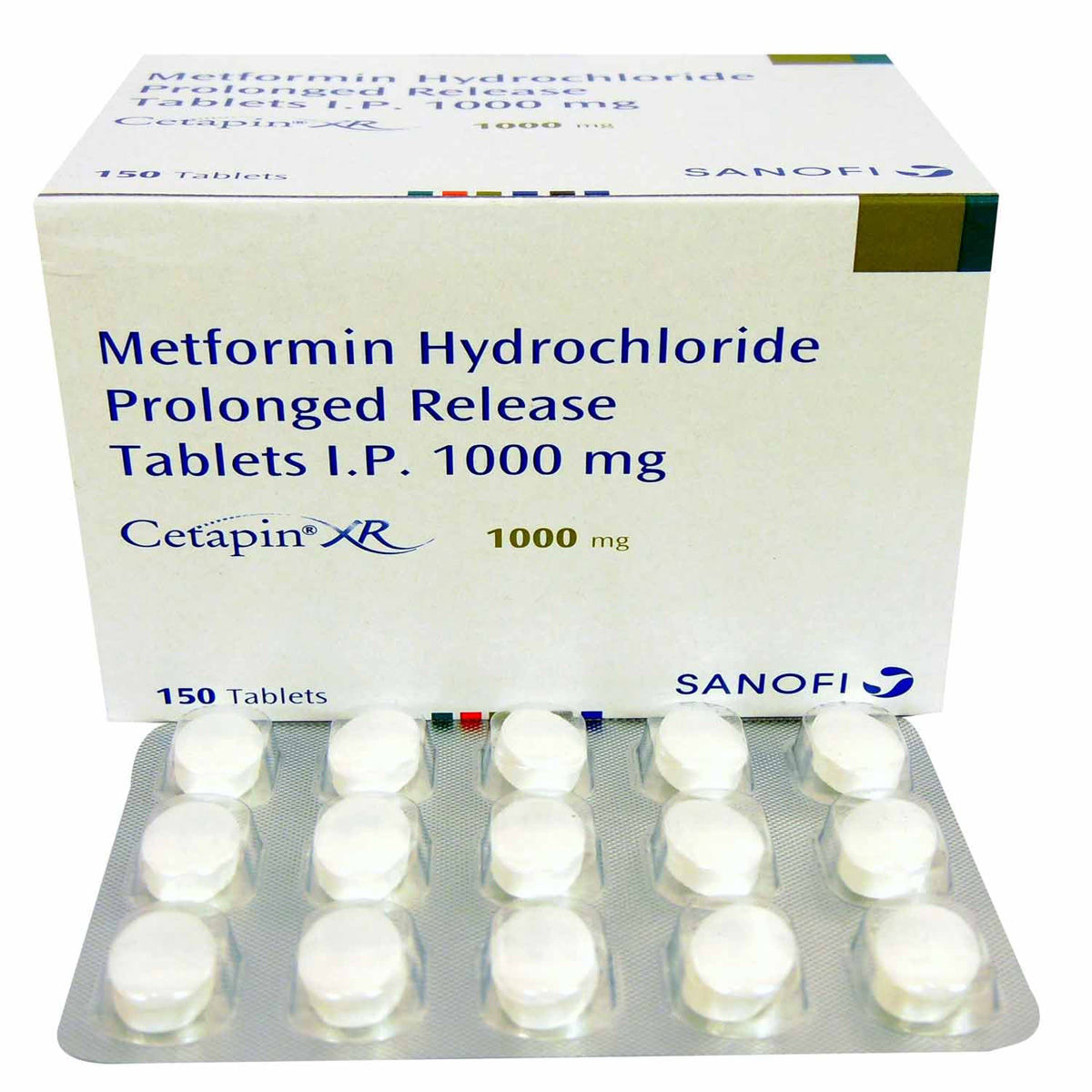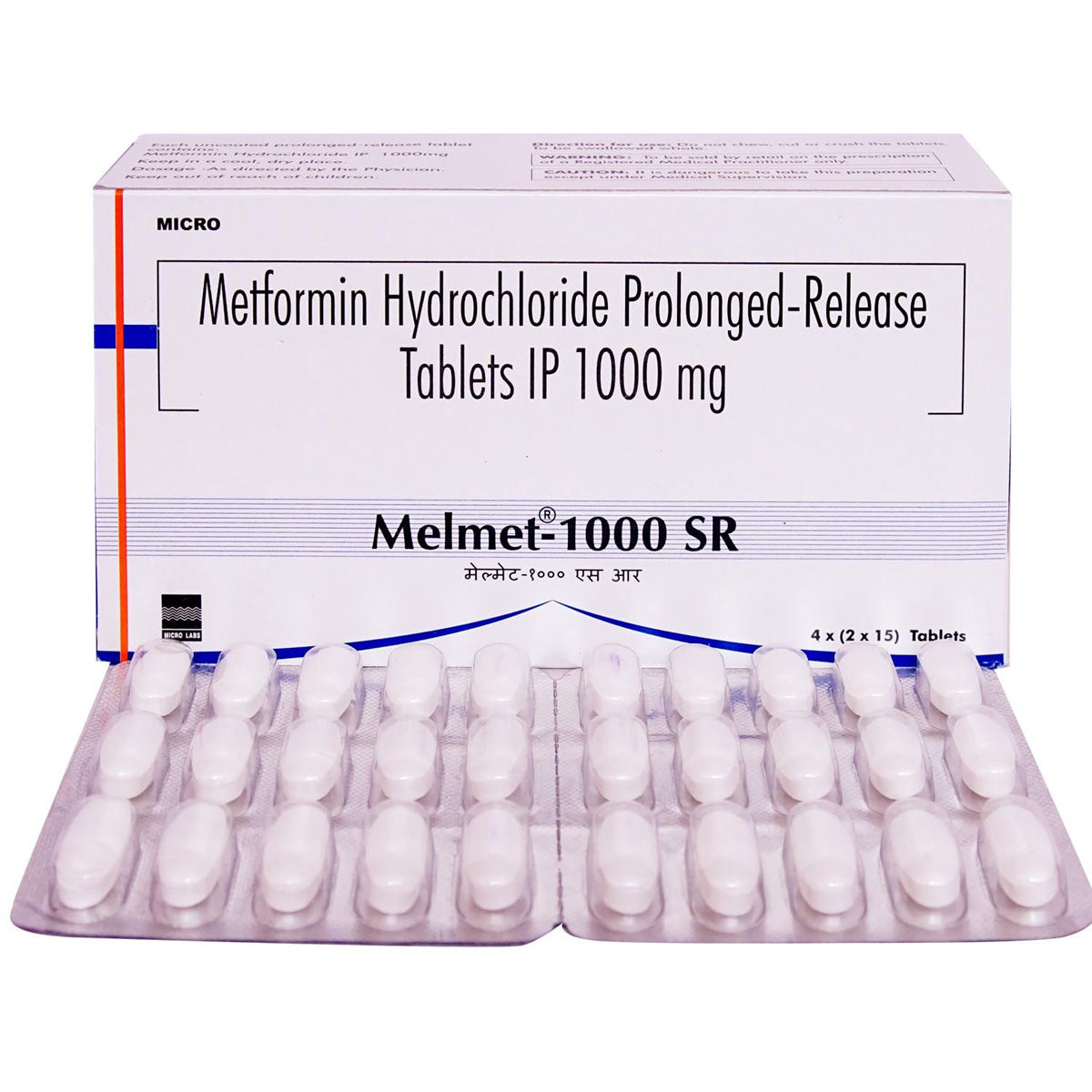Bimar 1000mg Tablet SR

₹31.5*
MRP ₹35
10% off
₹29.75*
MRP ₹35
15% CB
₹5.25 cashback(15%)
Free Delivery
With Circle membership
(Inclusive of all Taxes)
This offer price is valid on orders above ₹800. Apply coupon PHARMA10/PHARMA18 (excluding restricted items)
Bimar 1000mg Tablet SR is used to treat type 2 diabetes. It contains Metformin, which works by decreasing the amount of glucose absorbed from the food and the amount of glucose made by the liver. It also increases the body's response to insulin, a natural substance that controls the amount of glucose in the blood. Thereby, it helps control the amount of glucose (sugar) in the blood. In some cases, it may cause side effects like nausea, vomiting, diarrhoea, abdominal pain, and loss of appetite. Before taking this medicine, you should tell your doctor if you are allergic to any of its components or if you are pregnant/breastfeeding, and about all the medications you are taking and pre-existing medical conditions.
Know Your Delivery Time
Provide Delivery Location
 Prescription drug
Prescription drugWhats That

Secure Payment

India's Most Trusted Pharmacy

Genuine Products
Synonym :
Composition :
Consume Type :
Return Policy :
About Bimar 1000mg Tablet SR
Bimar 1000mg Tablet SR used to treat type 2 diabetes when diet and exercise alone have not been enough to control the blood glucose levels. Type 2 diabetes is a chronic condition that affects how the body processes glucose.
Bimar 1000mg Tablet SR contains Metformin, which works by decreasing the amount of glucose absorbed from the food and the amount of glucose made by the liver. It also increases the body's response to insulin, a natural substance that controls the amount of glucose in the blood. Thereby, Bimar 1000mg Tablet SR helps control the amount of glucose (sugar) in the blood.
In some cases, Bimar 1000mg Tablet SR may cause side effects like nausea, vomiting, diarrhoea, abdominal pain, and loss of appetite. Most of these side effects do not require medical attention and resolve gradually over time. However, if the side effects persist or worsen, consult the doctor.
Do not take Bimar 1000mg Tablet SR if you are allergic to any of its components. Consult your doctor if you are pregnant or breastfeeding. Bimar 1000mg Tablet SR is safe for use in children above 10 years if prescribed by the doctor. Keep the doctor informed about your health condition and medications to rule out any side effects/interactions.
Uses of Bimar 1000mg Tablet SR
• Type 2 Diabetes Management: Bimar 1000mg Tablet SR helps to control blood sugar levels by decreasing glucose production in the liver, improving insulin sensitivity, and enhancing glucose uptake by muscles.
Directions for Use
- Take Bimar 1000mg Tablet SR just after a meal or with a snack.
- Follow your doctor's instructions on the dosage and timing of this medication.
- Swallow Bimar 1000mg Tablet SR as a whole with a glass of water.
- Do not crush, break, or chew it.
Medicinal Benefits
- Bimar 1000mg Tablet SR belongs to a group of anti-diabetic medicines called biguanides, which help manage diabetes and achieve good control of blood sugar levels by delaying the absorption of sugar and increasing insulin sensitivity in the body.
- It does not cause a sudden lowering of the blood glucose level or cause significant hypoglycaemia.
- Unlike other anti-diabetic therapies like sulfonylureas or insulin, Bimar 1000mg Tablet SR does not cause weight gain but may cause modest weight loss.
- In the prediabetic condition, Bimar 1000mg Tablet SR is the only recommended treatment available.
- Bimar 1000mg Tablet SR also helps to prevent serious complications of diabetes such as kidney damage (diabetic nephropathy), blindness (diabetic retinopathy), loss of sensation in your hands and feet (diabetic neuropathy) or even loss of a foot.
- It also helps to reduce your chances of having a heart attack or stroke.
How Bimar 1000mg Tablet SR Works
Storage
- Inform Your Doctor: Notify your doctor immediately about your diarrhoea symptoms. This allows them to adjust your medication or provide guidance on managing side effects.
- Stay Hydrated: Drink plenty of fluids to replace lost water and electrolytes. Choose water, clear broth, and electrolyte-rich drinks. Avoid carbonated or caffeinated beverages to effectively rehydrate your body.
- Follow a Bland Diet: Eat easy-to-digest foods to help firm up your stool and settle your stomach. Try incorporating bananas, rice, applesauce, toast, plain crackers, and boiled vegetables into your diet.
- Avoid Trigger Foods: Steer clear of foods that can worsen diarrhoea, such as spicy, fatty, or greasy foods, high-fibre foods, and dairy products (especially if you're lactose intolerant).
- Practice Good Hygiene: Maintain good hygiene to prevent the spread of infection. To stay healthy, wash your hands frequently, clean and disinfect surfaces regularly, and avoid exchanging personal belongings with others.
- Take Anti-Diarrheal Medications: If your doctor advises, anti-diarrheal medications such as loperamide might help manage diarrhoea symptoms. Always follow your doctor's directions.
- Keep track of your diarrhoea symptoms. If they don't get better or worse or are accompanied by severe stomach pain, blood, or dehydration signs (like extreme thirst or dark urine), seek medical help.
- Inform your doctor about the nausea and discuss possible alternatives to the medication or adjustments to the dosage.
- Divide your daily food intake into smaller, more frequent meals to reduce nausea.
- Opt for bland, easily digestible foods like crackers, toast, plain rice, bananas, and applesauce.
- Avoid certain foods that can trigger nausea, such as fatty, greasy, spicy, and smelly foods.
- Drink plenty of fluids, such as water, clear broth, or electrolyte-rich beverages like coconut water or sports drinks.
- Use ginger (tea, ale, or candies) to help relieve nausea.
- Get adequate rest and also avoid strenuous activities that can worsen nausea.
- Talk to your doctor about taking anti-nausea medication if your nausea is severe.
- Record when your nausea occurs, what triggers it, and what provides relief to help you identify patterns and manage your symptoms more effectively.
- Preventing Vomiting (Before it Happens)
- Take medication exactly as prescribed by your doctor. This can help minimize side effects, including vomiting.
- Having a small meal before taking your medication can help reduce nausea and vomiting.
- Talk to your doctor about taking anti-nausea medication along with your prescribed medication.
- Managing Vomiting (If it Happens)
- Try taking ginger in the form of tea, ale, or candy to help alleviate nausea and vomiting.
- What to Do if Vomiting Persists
- Consult your doctor if vomiting continues or worsens, consult the doctor for guidance on adjusting your medication or additional treatment.
- Tell your doctor about your GAS symptoms. They may change your medication regimen or prescribe additional drugs to help you manage them.
- To manage GAS symptoms, eat a balanced diet of fibre, vegetables, and fruits.
- Drink enough water throughout the day to avoid constipation and treat GAS symptoms.
- Regular exercise like yoga and walking may help stimulate digestion and alleviate GAS symptoms.
- Take probiotics only if your doctor advises, as they may help alleviate GAS symptoms by promoting gut health.
- Take medication for GAS symptoms only if your doctor advises, as certain medications can interact with your existing prescriptions or worsen symptoms.
- If symptoms persist, worsen, or are accompanied by severe abdominal pain, vomiting, or bleeding, seek immediate medical attention.
- If you experience low blood sugar levels, inform your doctor. They will assess the severity and make recommendations for the next actions.
- Your doctor will assess your symptoms, blood sugar levels, and overall health before recommending the best course of action, which may include treatment, lifestyle modifications, or prescription adjustments.
- Follow your doctor's instructions carefully to manage the episode and adjust your treatment plan.
- Make medication adjustments as recommended by your doctor to prevent future episodes.
- Implement diet and lifestyle modifications as your doctor advises to manage low blood sugar levels.
- Monitor your blood sugar levels closely for patterns and changes.
- Track your progress by recording your blood sugar levels, food intake, and physical activity.
- Seek further guidance from your doctor if symptoms persist or worsen so that your treatment plan can be revised.
- Take medications with food (if recommended): It can help prevent stomach distress and indigestion.
- Eat smaller, more frequent meals: Divide daily food intake into smaller, more frequent meals to ease digestion.
- Avoid trigger foods: Identify and avoid foods that trigger indigestion, such as spicy, fatty, or acidic foods.
- Stay upright after eating: Sit or stand upright for at least 1-2 hours after eating to prevent stomach acid from flowing into the oesophagus.
- Avoid carbonated drinks: Avoid drinking carbonated beverages, such as soda or beer, which can worsen indigestion.
- Manage stress: To alleviate indigestion, engage in stress-reducing activities like deep breathing exercises or meditation.
- Consult a doctor if needed: If indigestion worsens or persists, consult a healthcare professional to adjust the medication regimen or explore alternative treatments.
- Rest well; get enough sleep.
- Eat a balanced diet and drink enough water.
- Manage stress with yoga and meditation.
- Limit alcohol and caffeine.
- Physical activities like walking or jogging might help boost energy and make you feel less tired.
What if I have taken an overdose of Bimar 1000mg Tablet SR
Drug Warnings
- Do not take Bimar 1000mg Tablet SR if you are allergic to any of its components or if you have severe kidney disease, diabetic ketoacidosis, or metabolic acidosis.
- Inform your doctor if you have dehydration, infections, liver or kidney problems, uncontrolled diabetes, heart problems, or low levels of vitamin B12.
- Consult your doctor if you are pregnant, plan to become pregnant or are breastfeeding.
- Seek medical attention if you experience symptoms of lactic acidosis (vomiting, abdominal pain, muscle cramps, severe tiredness, difficulty breathing, and reduced body temperature and heartbeat) or dehydration (severe vomiting, diarrhoea, exposure to heat, fever or if you drink less fluid than normal).
Drug-Drug Interactions
Drug-Drug Interactions
Login/Sign Up
Co-administration of Ioglicic acid with Bimar 1000mg Tablet SR can increase the risk of side effects.
How to manage the interaction:
Taking Bimar 1000mg Tablet SR with Ioglicic acid is generally avoided as it can result in an interaction, please consult your doctor before taking it.
Co-administration of Bimar 1000mg Tablet SR and Iobenzamic acid can increase the risk of lactic acidosis (when the body produces too much lactic acid).
How to manage the interaction:
Taking Bimar 1000mg Tablet SR with Iobenzamic acid is generally avoided as it can result in an interaction, please consult your doctor before taking it.
Co-administration of Bimar 1000mg Tablet SR and Iocarmic acid can increase the risk of lactic acidosis (when the body produces too much lactic acid).
How to manage the interaction:
Taking Bimar 1000mg Tablet SR with Iocarmic acid is generally avoided as it can result in an interaction. please consult your doctor before taking it.
Co-administration of Bimar 1000mg Tablet SR and Iobitridol can increase the risk of lactic acidosis (when the body produces too much lactic acid).
How to manage the interaction:
Taking Bimar 1000mg Tablet SR with Iobitridol is generally avoided as it can result in an interaction. Please consult your doctor before taking it.
Co-administration of Iopamidol with Bimar 1000mg Tablet SR can increase the risk of side effects.
How to manage the interaction:
Taking Bimar 1000mg Tablet SR with Iopamidol is not recommended, please consult a doctor before taking it. Do not discontinue the medications without consulting a doctor.
Co-administration of Iopanoic acid with Bimar 1000mg Tablet SR can increase the risk of side effects.
How to manage the interaction:
Taking Bimar 1000mg Tablet SR with Iopanoic acid is not recommended, please consult your doctor before taking it.
Co-administration of Bimar 1000mg Tablet SR and Iocetamic acid can increase the risk of lactic acidosis (when the body produces too much lactic acid).
How to manage the interaction:
Taking Bimar 1000mg Tablet SR with Iocetamic acid is generally avoided as it can result in an interaction, please consult your doctor before taking it.
Co-administration of Iopromide with Bimar 1000mg Tablet SR can increase the risk of lactic acidosis.
How to manage the interaction:
Taking Iopromide with Bimar 1000mg Tablet SR is not recommended, please consult a doctor before taking it. Do not discontinue the medication without consulting a doctor.
Co-administration of Iofendylate with Bimar 1000mg Tablet SR can increase the risk of side effects.
How to manage the interaction:
Taking Bimar 1000mg Tablet SR with Iofendylate is generally avoided as it can result in an interaction, please consult your doctor before taking it.
Co-administration of Bimar 1000mg Tablet SR with Metrizamide together can cause the risk of lactic acidosis (when the body produces too much lactic acid ).
How to manage the interaction:
Taking Bimar 1000mg Tablet SR with Metrizamide is generally avoided as it can possibly result in an interaction, it can be taken if a doctor has advised it. However, if you experience headaches, muscle cramps or pain, contact a doctor immediately. Do not discontinue any medications without consulting a doctor.
Drug-Food Interactions
Drug-Food Interactions
Login/Sign Up
Diet & Lifestyle Advise
- Invest at least 150 minutes of your week in moderate-intensity physical activity or one hour and 15 minutes of high-intensity exercise every week.
- Losing weight gradually to achieve a healthy body mass index (18.5 to 24.9).
- Replacing refined carbohydrate-containing foods with whole grain foods and increasing intake of fruits and veggies and other fibre-enriched foods.
- Reduce intake of saturated fat (or hidden fats) in food like chips, crisps, pastries, biscuits, and samosas. Choose omega-3 fatty acid-containing oils for daily cooking. For frying, you can use palm oil, mustard oil, groundnut oil, rice bran oil, and safflower oil.
- Avoid taking too much stress as it may elevate your blood sugar level. You can adopt stress management techniques like mindfulness to control stress-related blood sugar changes or meditation or yoga.
- Opt for low-fat dairy products (low-fat yoghurt, fat-free milk, cheese, etc.).
- Keep your blood pressure as normal (140/90) as possible, as it reduces the risk of cardiovascular diseases in diabetes patients.
- Try to quit smoking and reduce your intake of carbohydrate-rich foods like potatoes, rice, mangoes, bread, sugar, etc.
Habit Forming
Therapeutic Class
Product Substitutes
Alcohol
Unsafe
It is advisable not to consume alcohol along with Bimar 1000mg Tablet SR to avoid unpleasant side effects like lactic acidosis.
Pregnancy
Caution
Consult the doctor if you are pregnant. This medicine should be used during pregnancy only if clearly needed.
Breast Feeding
Caution
Bimar 1000mg Tablet SR is not recommended if you are breastfeeding or if you are planning to breastfeed your baby.
Driving
Safe if prescribed
Bimar 1000mg Tablet SR may not affect your ability to drive. However, drive or operate machinery only if you are alert.
Liver
Caution
Bimar 1000mg Tablet SR to be taken with caution, especially if you have a history of liver diseases/conditions. The dose may have to be adjusted by your doctor.
Kidney
Caution
Bimar 1000mg Tablet SR to be taken with caution, especially if you have a history of kidney diseases/conditions. The dose may have to be adjusted by your doctor depending on your renal function. Bimar 1000mg Tablet SR is not recommended in severe kidney disease. Regular monitoring of kidney function tests is therefore important if you're taking Bimar 1000mg Tablet SR.
Children
Caution
Bimar 1000mg Tablet SR is not recommended for children below 10 years of age. For children above 10 years, the dose will be recommended by the doctor.

Have a query?
FAQs
Bimar 1000mg Tablet SR is used to treat type 2 diabetes mellitus.
Bimar 1000mg Tablet SR lowers blood glucose levels by decreasing the amount of glucose absorbed from the food and the amount of glucose made by the liver.
Bimar 1000mg Tablet SR is associated with either modest weight loss or stable body weight. However, if you experience excessive weight loss while on treatment with Bimar 1000mg Tablet SR, inform your doctor without any delay. There is a possibility that your dosage needs to be adjusted.
Yes. If you are taking Insulin regularly, you need to consult a doctor before taking Bimar 1000mg Tablet SR.
Try to take your medicine at the scheduled time, and do not skip your doses. If you forget to take Bimar 1000mg Tablet SR, do not take a double dose to make up for your forgotten dose. Taking an overdose might cause your sugar level to fall rapidly. Try to take the next dose at the usual time.
Do not take excessive alcohol while taking Bimar 1000mg Tablet SR, as this may increase the risk of a life-threatening condition called lactic acidosis (too much lactic acid in the body), which causes symptoms like dizziness, drowsiness, muscle pain, fast, shallow breathing, etc.
Contact your doctor before having an X-ray or scan which involves the injection of contrast materials that contain iodine into your bloodstream, as it may affect your kidney function.
Your doctor will decide when you must stop and when to restart your treatment with Bimar 1000mg Tablet SR before and after the surgery.
No. Bimar 1000mg Tablet SR is only prescribed for the treatment of type 2 diabetes, also called non-insulin-dependent diabetes. It is not indicated for type 1 diabetes.
Bimar 1000mg Tablet SR should be swallowed as a whole with water. Taking it with or after a meal helps prevent side effects affecting digestion.
Bimar 1000mg Tablet SR helps to lower your blood glucose to as normal a level as possible. It increases your body's response to insulin and decreases the amount of glucose absorbed from your food and the amount of glucose made by your liver.
Bimar 1000mg Tablet SR may not make you sleepy. Consult the doctor if you experience sleepiness, as it could be a sign of ketoacidosis.
Symptoms of lactic acidosis include abdominal pain, vomiting, muscle cramps, difficulty breathing, reduced body temperature and heartbeat, and severe tiredness. Consult the doctor if you experience these symptoms.
Bimar 1000mg Tablet SR can be used during pregnancy only if prescribed by the doctor. Please consult the doctor if you are pregnant, planning for pregnancy or think you may be pregnant.
Bimar 1000mg Tablet SR may cause side effects like nausea, vomiting, diarrhoea, abdominal pain, and loss of appetite. Most of these side effects do not require medical attention and resolve gradually overtime. However, if the side effects persist or worsen, consult the doctor.
Store Bimar 1000mg Tablet SR at room temperature, in a dry place. Keep it out of sight and reach of children.
Country of origin
Disclaimer
Author Details
We provide you with authentic, trustworthy and relevant information














